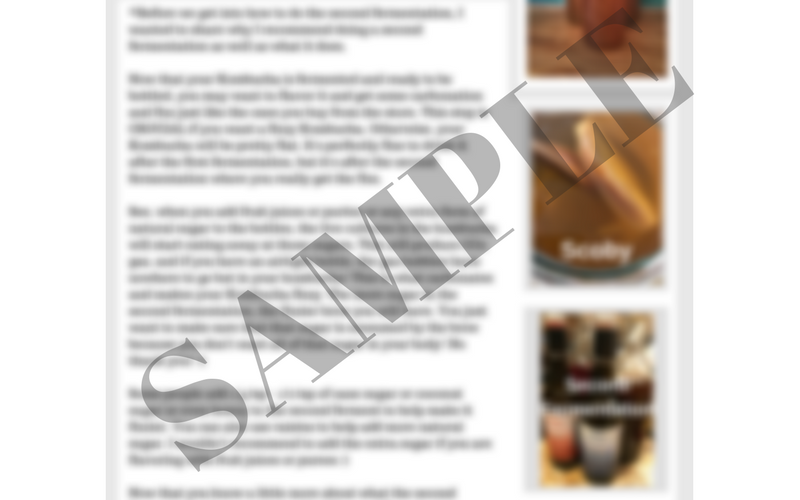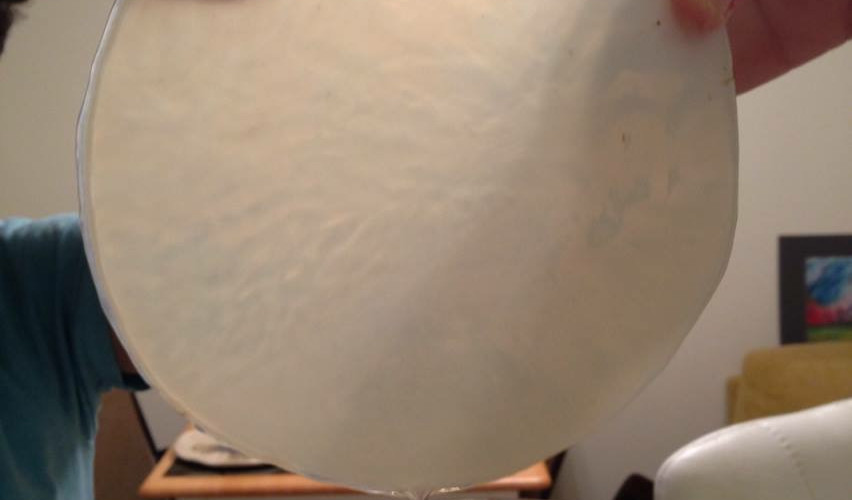8 Benefits of Kombucha & How to Make Your Own
- Dr. Holly & Sebastian Waite
- Jul 1, 2017
- 8 min read
FERMENTED FOODS
This is probably one of my favorite topics to talk about: FERMENTED FOODS! I LOVE making my own fermented foods such as: sauerkraut, fermented pickles, coconut kefir, and kombucha (just to name a few). The reason why I'm so passionate about it is because I had so many digestive health issues prior to starting my health journey. The first and biggest missing piece of my puzzle was getting under chiropractic care. That LITERALLY changed my digestion for the better. It turned the power on to my digestive organs to get them functioning again (because they weren't functioning very well). Once I was under regular chiropractic care, I decided that if I wanted to live a long, healthy life, that I needed to take care of myself better. If I wasn't healthy, I couldn't be a good husband, a good dad, a good entrepreneur, teacher etc. I could not be the best ME that I could be.
The next piece of my puzzle was FOOD, and I mean GOOD whole foods as well as fermented foods. I completely changed the way I ate and little by little began the process of healing my gut. I learned that I needed to "innoculate" my gut with good LIVING bacteria. I needed to change the environment in my gut to be filled with good bacteria vs bad bacteria. One of the ways I did this was by consuming fermented foods. Fermented foods contain live probiotics and enzymes. When first consuming these cultured foods, you may experience some symptoms of detoxification. These foods are very good at removing toxins from your body, so make sure to start slow. When it comes to Kombucha, I would recommend to start with 4 oz, and to slowly work your way up to 8 oz.
I have been brewing Kombucha for 6 almost 7 years now, and I just love it! It is SO rich in organic acids, probiotics, enzymes, and beneficial bacteria and yeast that our gut needs to be able to break down food. We need cultured foods in our guts because our gut environment has millions of bacteria and yeast, but not necessarily the good kind. We need to fight the bad bacteria and yeast in our bodies with GOOD bacteria and yeast.
When we consume processed foods and sugar, our body will become dominant in bad bacteria. We need to ingest good bacteria and yeast (in the form of probiotics), that aid our digestion and help defeat all of that bad bacteria and yeast! Kombucha is rich in saccharomyces boulardii which is a good yeast and probiotic to the gut. S. Boulardii helps us break down foods in our bodies as well as gives us energy and helps boost our immune system.
Only $5.99!!! LIMITED TIME! (Total Value of $19.99)
WHAT IS KOMBUCHA?
Kombucha is a fermented tea (usually black tea). The fermented tea is sweetened with cane sugar, and the sugar is consumed by the active culture in the tea called a SCOBY (Symbiotic Culture of Bacteria and Yeast). When the SCOBY consumes the sugar, it produces good bacteria and yeast as a bi-product. It is rich in probiotics, enzymes, and organic acids which aid digestion and gives you lots of energy.
The Kombucha tea has a disctinct tart yet slightly sweet flavor with a nice fizz that comes from the natural carbonation. Kombucha is a way better alternative to cabonated drinks such as soda.
Kombucha has been around for more than 2,000 years. It dates back to the Tsin-Dynasty in 221 B.C. (Chinese Empire). It was later brought to Dr. Kombu in Japan to treat the Japanese emperor, Inkyo, for digestive problems. While we are not certain of its exact origins, it is thought that Kombucha tea originated in China where they used honey as the sweetener instead of cane sugar. The Chinese referred to Kombucha as the "The Tea of Immortality". Kombucha also gained popularity in Russia where athletes drank the fermented tea to help with their muscle soreness. Kombucha tea eats away at lactic acid which is the acid that makes our muscles feel sore after a work out. Athletes drank the tea so that they could keep training without experiencing muscle soreness.
The tea, later on, gained popularity all over Europe, and it did not gain popularity in the US until the early to mid 1990's.
8 KOMBUCHA HEALTH BENEFITS & RESEARCH
Kombucha tea offers us many health benefits. Here some of the health benefits affiliated with drinking Kombucha:
1. Rich in antioxidants
Kombucha contains many antioxidants such as: Vitamin C, Vitamin E, beta-carotene and other carotenoids. It has been found that Kombucha's antioxidant activity is 100 times higher than vitamin C and 25 times higher than vitamin E. [1]
2. Digestive Issues
Kombucha has been shown to heal stomach ulcers. Researchers say that the fermented tea protects the gastric mucin (the stomach's protective mucous lining) content of the stomach. The antioxidants in Kombucha protect the lining of the gut.
The tea also reduces gastric acid secretion. The secretion can damage the mucous membrane in the gut. Kombucha has been found as effective in healing ulcers as prescription omeprazole (brand name Prilosec).[2]
3. Liver Health
Kombucha protects against liver toxicity in animals from overdoses of acetaminophen (Tylenol).[3] It is also beneficial to humans by detoxifying the liver.[4]
4. Antibiotic Resistant Infections
Kombucha contains strong antibacterials to combat infectious diseases such as diptheria, scarlet fever, influenza, typhoid, paratyphoid fever, and dysentery.[5] Its high acidity levels (which alkalize in the gut) makes it effective against Helicobacter pylori, Salmonella typhimurium, Staphylococcus aureus, and Bacillus cereus. Kombucha may make for an effective alternative to synthetic antimicrobials that are becoming increasingly ineffective.[6]
5. Joint Issues
Kombucha is high in glucuronic acid which can be converted by the body into glucosamine, chondroitin-sulphate, and other polysaccharides and glucoproteins associated with cartilage, collagen, and the fluid that lubricates joints.[7] It may also help relieve arthritis, rheumatism, and gout. Kombucha also has high anti-inflammatory properties.
6. Asthma
Daily kombucha intake is suggested to help asthma patients. It contains significant amounts of theophyline, a bronchodilator. [8] The treatment dose of theophyline is 0.18–1.0 g daily. Eight ounces of kombucha contain approximately 1.44 mg of theophyline..
7. Toxicity in the Kidneys
Kombucha may help eliminate kidney damage caused by environmental pollutants and may be beneficial to patients suffering from renal impairment.[9] Kombucha has also been used to prevent calcification in the kidney and may prevent the formation of kidney stones.[10]
8. Diabetes
Research dating back to 1929 found kombucha can decrease blood sugar levels. More recent animal studies report that kombucha significantly reduces blood sugar levels in diabetic rats.[11] Another study suggested kombucha may be considered a candidate for the treatment and prevention of diabetes.[12]
COMMENTS
I hope from reading this article that you have learned a little more about what kombucha is as well as it's health benefits.
I wanted to mention that if you make your own Kombucha it is wayyyy more beneficial than what you can buy at the store because you can control the sugar content in your brew. Many brands that you buy at the store will add sugar to bottles when they do the second fermentation in order to make the Kombucha extra fizzy. There is no guarantee if they let the tea ferment enough for the amount of sugar that was added to be eaten up by the cultures in the Kombucha. I'd rather not take the risk because I prefer to make my own and make sure that most if not ALL of the sugar content is out of my brew. For more information on HOW TO MAKE YOUR OWN KOMBUCHA, I have created a STEP BY STEP guide on how to brew your own Kombucha. In the guide, I tell you exactly what you will need as well as over 40 different ways to flavor your Kombucha. It is VERY easy to follow, and illustrated. I hope you enjoy the guide and making your own Kombucha as much as I do. It really is VERY easy to make if you just follow the simple steps in the guide.
Pictures of my Kombucha
Cherry Vanilla Kombucha (Recipe in the guide)
How to make Kombucha Guide
Only $5.99!!! (Total Value of $19.99)
In this guide you will learn how to brew your Kombucha from beginning to end. You will learn about what materials you need as well as how to flavor your Kombucha! You will learn how EASY it is as well as how inexpensive it is to make your own at home. A bottle from the store can cost up to $5 dollars! You can brew A GALLON of Kombucha at home for less than $1.50! It is really fun to make your own flavors, and in the guide there are over 40 flavoring ideas! There are recipes, and expert tips to help you make the fizziest of Kombucha! When you purchase your guide, feel free to ask any questions in the comments below! We are here to help you make Kombucha successfully! :) ENJOY!
P.S. ONCE YOU PURCHASE THE COMPLETE KOMBUCHA GUIDE, MAKE SURE TO CLICK ON "RETURN TO MERCHANT" TO DOWNLOAD YOUR FILE. MAKE SURE TO SAVE YOUR FILE FOR KEEPSAKE. IF ANYTHING HAPPENS WHERE YOUR FILE DOES NOT DOWNLOAD, PLEASE CONTACT INFO@SETAPARTHEALTH.COM AND WE WILL MAKE SURE YOU GET YOUR GUIDE.

PRODUCTS YOU WILL NEED TO MAKE KOMBUCHA
*Note: You won't need all of these products. Here are just a couple of options, so that you can have choices. 1 Gallon of Kombucha make approximately 3 32 oz Bottles & 1 16 oz bottle.
OR
7 16 Oz bottles of Kombucha.
OR
9-10 12 Oz bottles of Kombucha.
The size of the bottles is totally up to you. Just remember that you will use less kombucha if you flavor it, so you will need more bottles. I tend to leave about 2 cups of starter liquid when I bottle my finished batch for the next batch. I usually bottle around 112 Oz of Kombucha after every gallon batch. I leave about 16 oz of starter liquid behind for my next batch like I mentioned above.
1 SCOBY (here's the link)
Flip Top Bottles 32 Oz (here's the link)
Flip Top Bottles 16 Oz (here's the link)
Flip Top Bottles 12 Oz (here's the link)
Organic Green Tea (here's the link)
Organic Oolong Tea (here's the link)
Organic Black Tea (here's the link)
Gallon Glass Jar (here's the link)
Cheesecloth (Fine) (here's the link)
Organic Sugar (here's the link)
Gallon Glass Jar with Spigot (I'd suggest to change the spigot to a stainless steel one) (here's the link)
Stainless Steel Spigot (here's the link)
RESOURCES
1. Adriani L, Mayasari N, Kartasudjana RA: "The effect of feeding fermented kombucha tea on HLD, LDL and total cholesterol levels in the duck bloods." Biotechnol Anim Husb 2011;27:1749–1755.
2. Banerjee D, Hassarajani SA, Maity B, Narayan G, Bandyopadhyay SK, Chattopadhyay S: Comparative healing property of kombucha tea and black tea against indomethacin-induced gastric ulceration in mice: possible mechanism of action. Food Funct 2010;1:284–293.
3. Pauline T, Dipti P, Anju B, Kavimani S, Sharma SK, Kain AK, Sarada SKS, Sai Ram M, Ilavazhagan G, Kumar D, Selvamurthy W: "Studies on toxicity; anti-stress and hepatoprotective properties of kombucha tea." Biomed Environ Sci 2001;14:207–213.
4. Jalil A, Amin D, Mohammad HF, Saeid H: "Protective effect of kombucha tea against acetaminophen-induced hepatotoxicity in mice: a biochemical and histopathological study." Comp Clin Path 2012;21:1243–1248.
5. Talawat S, Ahantharik P, Laohawiwattanakul S, Premsuk A, Ratanapo S: "Efficacy of fermented teas in antibacterial activity." Kasetsart J Nat Sci 2006;40:925–933.
6. Mo H, Zhu Y, Chen Z: "Microbial fermented tea—a potential source of natural food preservatives." Trends Food Sci Technol 2008;19:124–130.
7. Jayabalan R, Marimuthu S, Swaminathan K: "Changes in content of organic acids and tea polyphenols during kombucha tea fermentation." Food Chem 2007;102:392–398.
8. Pasha C, Reddy G: "Nutritional and medicinal improvement of black tea by yeast fermentation." Food Chem 2005;89:449–453.
9. Gharib OA: "Effects of kombucha on oxidative stress induced nephrotoxicity in rats." Chin Med 2009;4:23.
10. Dufresne C, Farnworth E: "Tea, kombucha and health: a review." Food Res Int 2000;33:409–421.
11. Shenoy C: "Hypoglycemic activity of bio-tea in mice." Indian J Exp Biol 2000;38:278–279.
12. Aloulou A, Hamden K, Elloumi D, Ali MB, Hargafi K, Jaouadi B, Ayadi F, Elfeki A, Ammar E: Hypoglycemic and antilipidemic properties of kombucha tea in alloxan-induced diabetic rats. BMC Complement Altern Med 2012;12:63.







































Comments